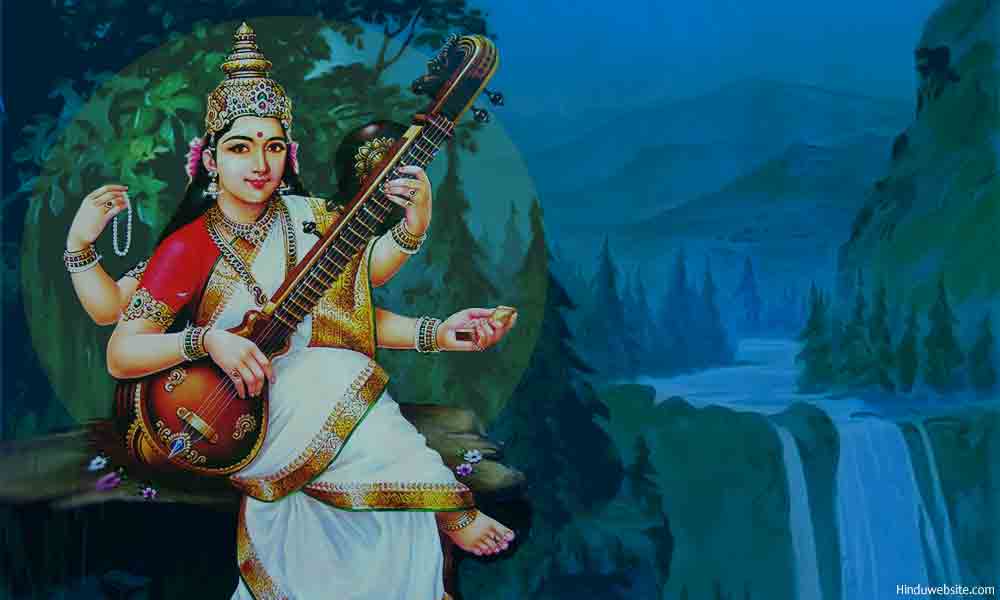
Sarasvathī Sthothram from The Thanthrasāra

Aum, Shri Mathre Namah
Sarasvathi is the goddess of speech, eloquence, knowledge, and learning, and Śakti of Brahmā; but formerly, according to the Purāṇic account, the Spouse of Viṣṇu, represented as a fair woman with either four or two arms, and often as seated on a lotus holding a vīnā. The Bhāradvaja Smr. says: "Sarasvatī is She who ever resides in the tongue of all beings and who causes speech." According to the Vasiṣṭha Rāmā, cited in the Lalitā, verse 137, She is called Sarasvatī as the possessor (vati) of the saras (flow of nectar from the brahmarandhra). The Brahmā Purāṇa says the Devī created Sarasvatī from Her tongue, and from Her shoulders the science of love.
Sarasvatīstotram
1.HRĪM, HRĪM is Thy most pleasing bīja,
O Thou whose moon-like beauty is heightened
By the lotuses (which surround Thee).
O auspicious and favourable Devī!
Forest fire of the forest of evil thoughts,
Whose lotus feet are worshipped by the universe.
O lotus seated upon a lotus,
Joy dost thou cause to those who salute Thee,
Destroyer of Ignorance,
Spouse of Hari,
Substance of the world.
2. AIM, AIM is Thy favourite mantra,
Thou who art both form and formlessness,
Who art the wealth of the lotus face of the lotus-born,
Embodiment of all guṇas, yet devoid of attributes,
Changeless, and neither gross nor subtle.
None know Thy nature, nor is Thy inner reality known.
Thou art the whole universe;
And Thou it is who existeth within it.
Thou art saluted by the foremost of Devas.
Without part Thou existeth in Thy fulness everywhere.
Ever pure art Thou.
3. Greatly art Thou pleased with the recitation 4 of the mantra HRĪM.
Thy crown is white as snow.
Thy hands play with the vīnā.
O Mother! Mother! salutation to Thee.
Burn, burn my sloth and grant me great intelligence.
Thou art Knowledge itself.
The Vedānta ever sings of Thee.
Śruti 1 speaks of Thee.
O giver of liberation! O way to liberation!
Whose power is beyond all understanding.
O giver of happiness, adorned with a white necklace,
Grant to me Thy favours.
4. Thou art intelligence, intelligence, intelligence,
Thy names are memory, resolution, mind, and hymn of praise.
Eternal and fleeting,
Great cause, saluted by Munis,
New and old; 8 sacred current of virtue,
Saluted by Hari and Hara.
Ever pure, beauteous of colour,
The subtlest element 11 of things--
Yea, even the very half thereof.
Thou art the giver of intelligence, intelligence, intelligence.
Who art the giver of joy to Mādhava.
5. In the form of HRĪM, KṢĪM, DHĪM, HRĪM,
Thou holdest a book,
Thou art joyful, of smiling face, and of good fortune.
Innocence, current of charm,
With all powers of arrest.
Burn, burn my sin,
And dispel the darkness of my evil thoughts.
O praiseworthy of all!
Thou art Gīh, Gauh, Vāk, and Bhāratī.
It is Thou who grantest success to the tongue of the greatest of poets,
As also in the attainment of all (forms of) knowledge.
6. I pray to Thee, I pray to Thee, I bow to Thee,
Come to my tongue and never leave me.
May my intelligence never go astray,
May my sins be taken away,
May I be free from sorrow.
In time of peril may I never be bewildered.
May my mind work freely without impediment
In Śāstra disputation and verse.
7. He who chastely lives, observing silence and religious devotions,
Abstaining from flesh and fish on the thirteenth day of the month,
And bowed with devotion, early each morning
Praises Thee with the most excellent verse.
Will, skilful in speech, surpass even Vācaspati.
The uncleanliness of his sins will be swept away.
Such an one gains the fruit of his desires,
The Devī protects him as though he were Her own child.
Poetry flows from his mouth,
Prosperity attends his house,
And every obstacle to success will disappear.
8. Whoever reads without interruption the whole of this hymn
Twenty-one times on the thirteenth day of the month,
Both on the dark and the light side of the month,
And meditates on Sarasvatī garmented in white,
Adorned with white ornaments,
Such an one attains in this world the fruit of his desires.
This auspicious hymn has been made by Brahmā himself;
Whoever daily reads it with care acquires immortality.
Suggestions for Further Reading
- Adya Kali Svarupa Sthothram
- Bhairavi Sthothram From Tantra Sara
- Hymn to the Goddess Bhuvanesvari
- Hymn to Kala Bhairava
- Laksmī Sthothram From The Thanthra Sāra
- Mahiṣāmardinīstotra From The Tantrasāra
- Tharashtakam, a Hymn to Goddess Thara
- opular Prayers of Lord Ganesha
- General Purpose Hindu Prayers
- Popular Prayers of Lord Krishna
- Popular Prayers of Goddess Lakshmi
- Popular Prayers of Vishnu
- Popular Prayers of Goddess Sarasvathi
- Popular Prayers of Shakti, Devi, Mother Goddess
- English Devotional Prayers to Hindu Gods and Goddesses
- Essays On Dharma
- Esoteric Mystic Hinduism
- Introduction to Hinduism
- Hindu Way of Life
- Essays On Karma
- Hindu Rites and Rituals
- The Origin of The Sanskrit Language
- Symbolism in Hinduism
- Essays on The Upanishads
- Concepts of Hinduism
- Essays on Atman
- Hindu Festivals
- Spiritual Practice
- Right Living
- Yoga of Sorrow
- Happiness
- Mental Health
- Concepts of Buddhism
- General Essays
Source: From the Hymns to the Goddess by John Woodroffe (Arthur Avalon),1913. Readers please note that this is not an exact reproduction of the original text. We have made some changes to it and also added Sanskrit text in some cases. While we have taken every care to reproduce the original text in parts, we cannot guarantee its accuracy orauthenticity. Please check original copy for accuracy, study and research.